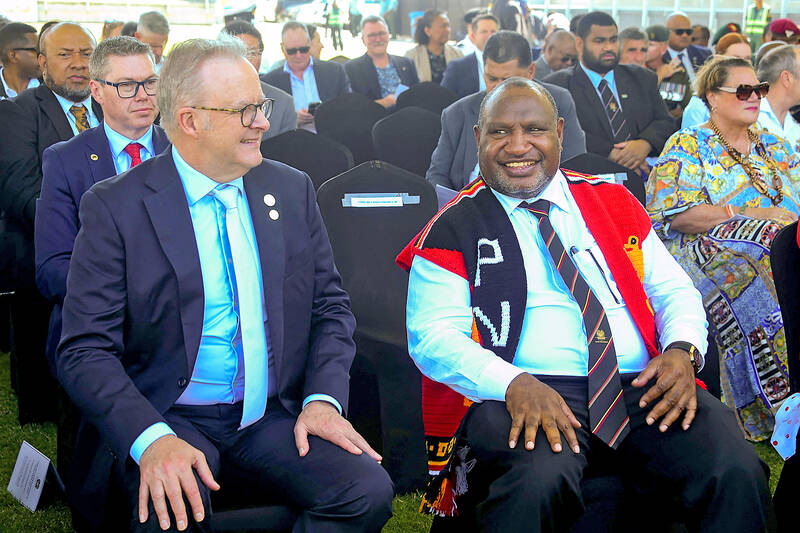Australian Prime Minister Anthony Albanese yesterday was unable to clinch an ambitious defense treaty with Papua New Guinea (PNG) during a visit to the country, a week after he failed to land a security pact with another South Pacific island neighbor, Vanuatu, aimed at curbing China’s influence in the region.
The diplomatic setbacks come ahead of his potential first meeting with US President Donald Trump next week, during which regional security would be on the agenda.
Albanese had announced that the bilateral treaty with PNG would be signed during his three-day visit to the country’s capital, Port Moresby, that ended yesterday.

Photo: AFP
However, a PNG Cabinet meeting scheduled for Monday to endorse the treaty never took place.
Instead of signing the treaty, Albanese and PNG Prime Minister James Marape released a communique that said the text had been agreed on and the document would be signed “following Cabinet processes in both countries.”
Albanese had similarly expected to sign a bilateral security and economic treaty during a visit to Vanuatu on Tuesday last week, but left the country with an assurance that negotiations would continue.
Vanuatuan Prime Minister Jotham Napat last week said that there were concerns within his government that the treaty could limit Vanuatu’s ability to raise money for critical infrastructure from any third country, such as China.
Albanese yesterday rejected a reporter’s suggestion that he was overreaching by trying to persuade countries to sign deals they were not ready for.
“Democracies aren’t the same as authoritarian regimes. They go through processes. We respect them,” Albanese said.
“Processes are important and sovereignty’s important, and we respect it and Papua New Guinea will go through its Cabinet processes, but we have ... agreed on the words in this treaty,” he added.

A Ministry of Foreign Affairs official yesterday said that a delegation that visited China for an APEC meeting did not receive any kind of treatment that downgraded Taiwan’s sovereignty. Department of International Organizations Director-General Jonathan Sun (孫儉元) said that he and a group of ministry officials visited Shenzhen, China, to attend the APEC Informal Senior Officials’ Meeting last month. The trip went “smoothly and safely” for all Taiwanese delegates, as the Chinese side arranged the trip in accordance with long-standing practices, Sun said at the ministry’s weekly briefing. The Taiwanese group did not encounter any political suppression, he said. Sun made the remarks when

The Taiwanese passport ranked 33rd in a global listing of passports by convenience this month, rising three places from last month’s ranking, but matching its position in January last year. The Henley Passport Index, an international ranking of passports by the number of designations its holder can travel to without a visa, showed that the Taiwan passport enables holders to travel to 139 countries and territories without a visa. Singapore’s passport was ranked the most powerful with visa-free access to 192 destinations out of 227, according to the index published on Tuesday by UK-based migration investment consultancy firm Henley and Partners. Japan’s and

BROAD AGREEMENT: The two are nearing a trade deal to reduce Taiwan’s tariff to 15% and a commitment for TSMC to build five more fabs, a ‘New York Times’ report said Taiwan and the US have reached a broad consensus on a trade deal, the Executive Yuan’s Office of Trade Negotiations said yesterday, after a report said that Washington is set to reduce Taiwan’s tariff rate to 15 percent. The New York Times on Monday reported that the two nations are nearing a trade deal to reduce Taiwan’s tariff rate to 15 percent and commit Taiwan Semiconductor Manufacturing Co (TSMC, 台積電) to building at least five more facilities in the US. “The agreement, which has been under negotiation for months, is being legally scrubbed and could be announced this month,” the paper said,

MIXED SOURCING: While Taiwan is expanding domestic production, it also sources munitions overseas, as some, like M855 rounds, are cheaper than locally made ones Taiwan and the US plan to jointly produce 155mm artillery shells, as the munition is in high demand due to the Ukraine-Russia war and should be useful in Taiwan’s self-defense, Armaments Bureau Director-General Lieutenant General Lin Wen-hsiang (林文祥) told lawmakers in Taipei yesterday. Lin was responding to questions about Taiwan’s partnership with allies in producing munitions at a meeting of the legislature’s Foreign Affairs and National Defense Committee. Given the intense demand for 155mm artillery shells in Ukraine’s defense against the Russian invasion, and in light of Taiwan’s own defensive needs, Taipei and Washington plan to jointly produce 155mm shells, said Lin,